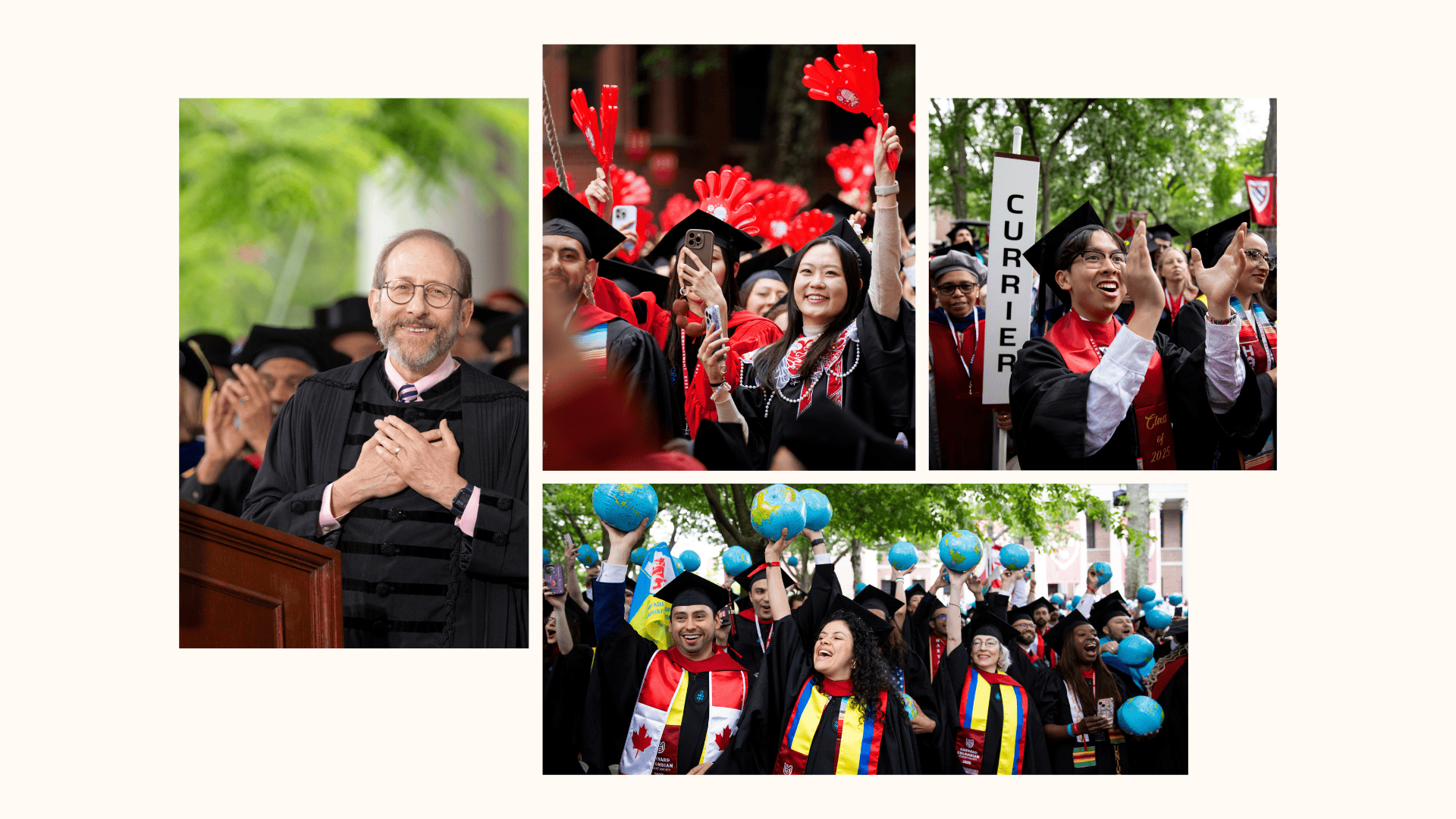
Photos by Niles Singer and Veasey Conway/Harvard Staff Photographers; photo illustration by Liz Zonarich/Harvard Staff
Proud day for Harvard
Joy, unity, and gratitude as University celebrates 374th Commencement
Part of the Commencement 2025 series
A collection of features and profiles covering Harvard University’s 374th Commencement.
All he got out was “Welcome,” before the crowd sprang to its feet to give a visibly moved President Alan Garber a standing ovation as he stood at the podium in the opening moments of Commencement. Across the Charles, University lawyers were presenting their case against a Trump administration move to block Harvard from enrolling international students. It was a graduation unlike others in its legal and political context but one that at its core remained deeply and distinctly personal. The blend of hope for the future, gratitude for family, friends, and teachers, and the poignancy of moving on were in evidence throughout the Yard. Here are some snapshots of the day.
Always remember: You might be wrong
In remarks to students, President Garber delivered a warning about the danger of getting too comfortable.
“The world as it is tempts us with the lure of what one might generously call comfortable thinking,” said Garber, “a habit of mind that readily convinces us of the merits of our own assumptions, the veracity of our own arguments, and the soundness of our own opinions, positions, and perspectives — so committed to our beliefs that we seek information that confirms them as we discredit evidence that refutes them.
“Though many would be loath to admit it, absolute certainty and willful ignorance are two sides of the same coin, a coin with no value but costs beyond measure. False conviction saps true potential. Focused on satisfying a deep desire to be right, we can willingly lose that which is so often gained from being wrong — humility, empathy, generosity, insight — squandering opportunities to expand our thinking and to change our minds in the process.”
Nearing the close of his address, he celebrated graduates as “the hope of this institution embodied — living proof that our mission changes not only the lives of individuals but also the trajectories of communities that you will join, serve, and lead.”
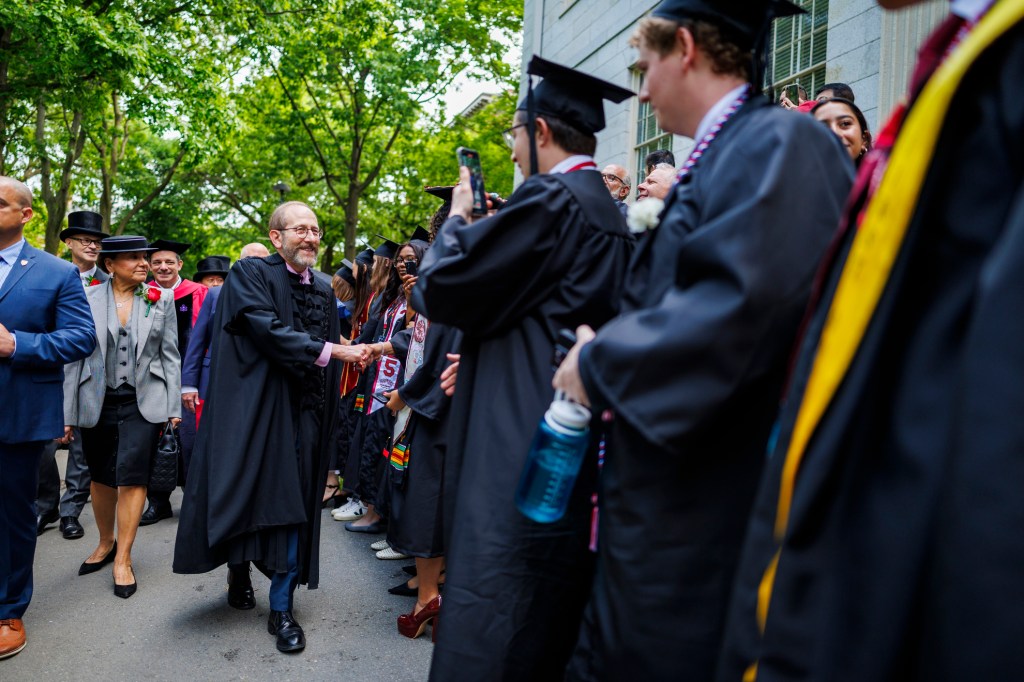
President Alan Garber processes into Tercentenary Theatre.
Stephanie Mitchell/Harvard Staff Photographer
‘Semper Veritas’
Early Thursday morning, tucked in a quiet, grassy nook in front of Holden Chapel, seniors gathered one last time to hear from Rakesh Khurana, the Danoff Dean of Harvard College.
In his final address to students before stepping down as dean, Khurana urged soon-to-be graduates to savor having reached such an important academic and personal milestone in their young lives.
“Enjoy this moment. Think of where you were four years ago, where you are today, and all that came in between, and embrace every second of this special day,” Khurana said.
He also urged students to use their time and talents to make positive contributions to the world. “Whatever your calling is in life, I encourage you to do good,” he said, later adding: “My fondest hope for all of you — that your education has helped prepare you to be good citizens and citizen leaders for our society. Go forth and make us proud.”
Khurana, who was named dean of the College in 2014, plans to return to the faculty of the Department of Sociology and Harvard Business School.
“I will miss you dearly, and it has been one of the greatest honors of my life to spend these last four years with you and to serve as dean of Harvard College,” he said. “Semper Veritas!”
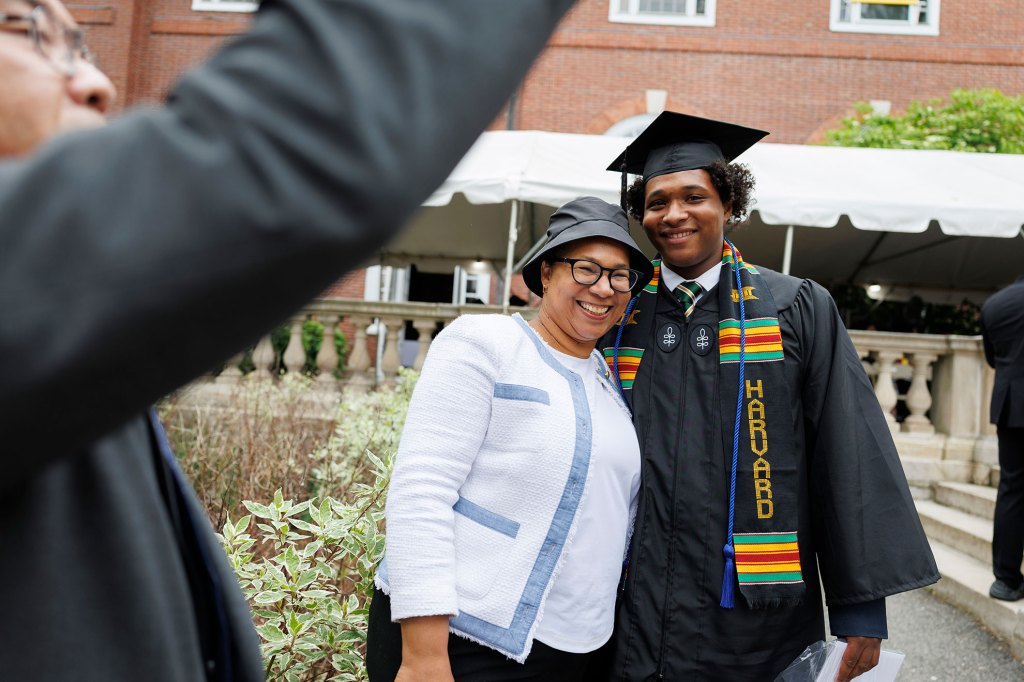
Jean-Marie Alves-Bradford, M.D. ’92, and her son Malik Aaron Bradford III at Eliot House.
Stephanie Mitchell/Harvard Staff Photographer
Opportunities and inspiration
More than three decades after her own Harvard graduation, Jean-Marie Alves-Bradford, M.D. ’92, beamed as her oldest son Malik Aaron Bradford III ’25 received his degree in biomedical engineering.
“I’m just so proud of him and it’s wonderful to see him accomplish this,” the former Kirkland House resident said. “This place has so many opportunities that he’s been a part of, and he’ll continue to grow from.”
She continued: “He’s really matured quite a bit. It’s been nice to see that evolution. He’s really settled and comfortable in his own skin.”
Alves-Bradford and her husband, Malik Bradford II, said they were excited for their son’s next steps. The new Harvard alumnus already has a job lined up after Commencement, the couple proudly shared. Bradford II shared his hope that Malik’s pursuits can be “applied in a way that’s going to help him feel fulfilled.”
A few feet away, fellow Eliot House parent Linda Erickson shared her excitement at seeing her daughter, Sarah Erickson ’25, accomplish her childhood dream.
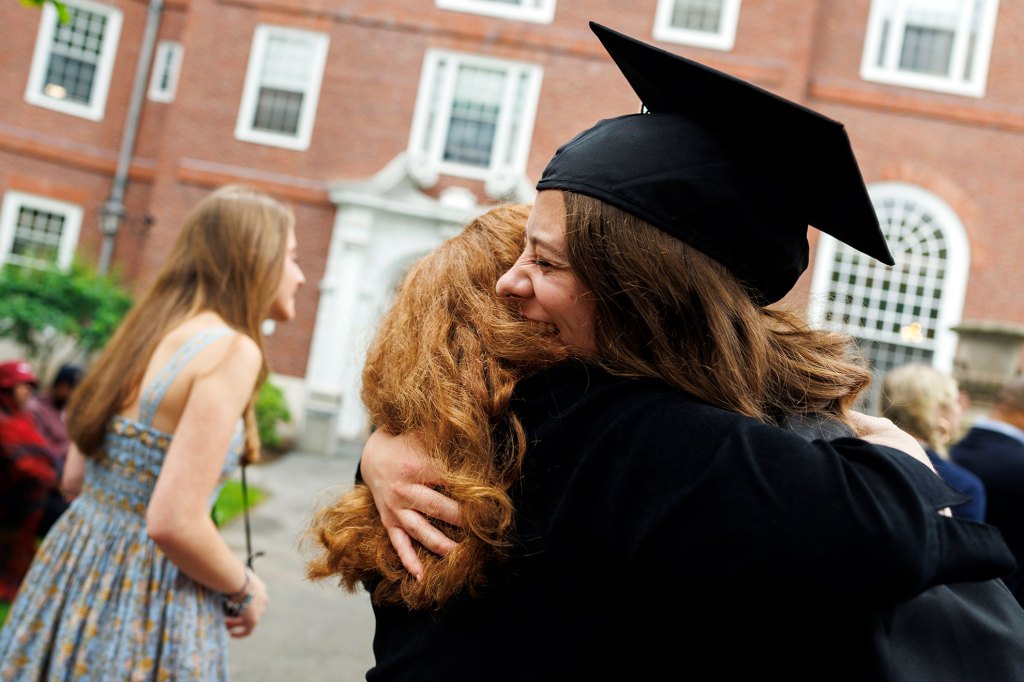
Linda Erickson embraces daughter Sarah just after she received her degree.
Stephanie Mitchell/Harvard Staff Photographer
“When she was 8 years old, she told me, ‘I want to go to Harvard someday.’ So, to see that dream realized over all these years has been absolutely amazing,” Linda said. “She has pushed herself so hard to achieve that goal and to get to this day has just been inspirational.”
Sarah, who was homeschooled in Cincinnati by her mother before starting high school, received her undergraduate degree in biomedical engineering. At Harvard, she danced and performed in musical theater with the Harvard-Radcliffe Modern Dance Company and became a staff photographer for the Harvard Crimson.
“She’s not the same girl I dropped off four years ago,” Linda said. “She’s built great memories here with all the people she’s interacted with. It’s been amazing.”
Despite threats, hope for future of higher ed
“Honestly, it still doesn’t feel real,” said Jesse Hernandez, about moving on from life at Harvard. “I’m first-generation too, so there’s a part of me that has trouble imagining what comes next after something like this.”
The College graduate who studied economics, resided in Lowell House, and plans to hunt for a job in finance this summer, was especially grateful his parents and younger brother could make the rare trip from Florida to offer their support. “It feels good to be celebrating with all the people that helped me get here.”
With many close friends who are international students, Hernandez said he’s worried about their future after the Trump administration’s effort to block Harvard from enrolling them.
“Everybody’s nervous. Just when you start to think things can’t get worse,” they do, he said. Despite the circumstances, Hernandez said he’s trying to stay positive.
“I’ve got confidence that we’ll see this through, and that higher education won’t die today.”
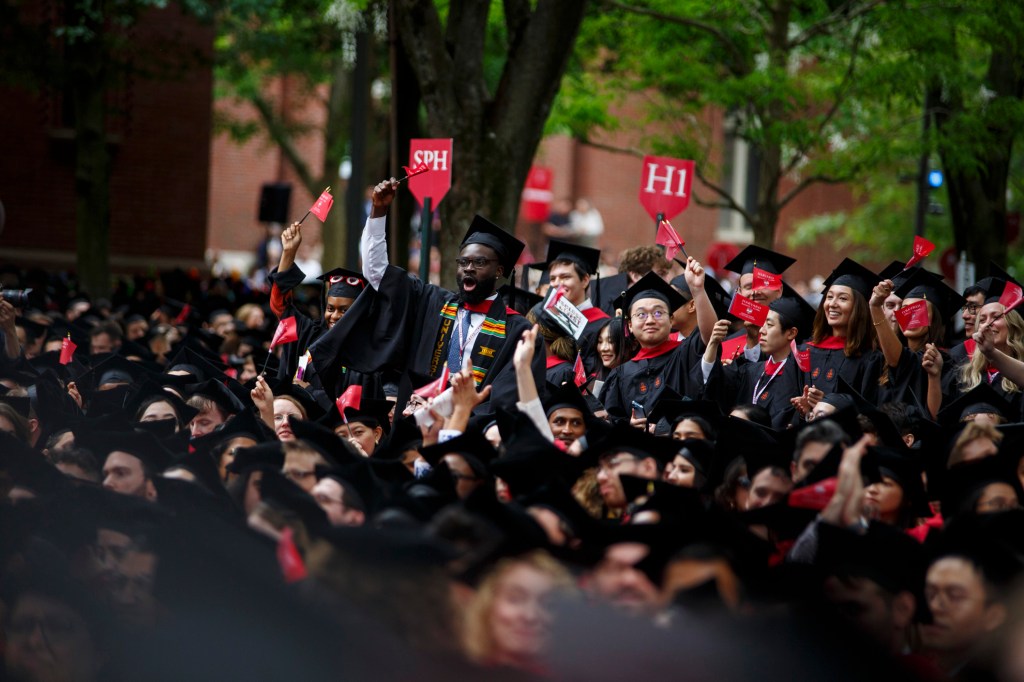
Jubilant graduates fill Tercentenary Theatre.
Photo by Grace DuVal
3 years after knee tear, starting a new career
Danielle Ray’s journey to Harvard began with a knee injury. The professional squash player born in Calgary, Canada, had competed professionally since graduating from Cornell, but during the 2022 Canadian National Championships, she took an awkward step and tore her ACL, MCL, and meniscus all at once.
“It just got stuck on the floor as I was turning and just collapsed in,” she said.
Facing the prospect of multiple surgeries and many months out of the sport, Ray looked for something she could do in the meantime that could prepare her for the future. Her now-husband, who had graduated from Harvard with a master’s degree, suggested the Harvard Extension School.
A month later, Ray was enrolled in a master’s degree in information management systems. “I blew my knee out in June,” she said, “and I started the program in July.”
The program, Ray found, was a good mix of technical and policy-based courses. Her favorite course, “Fundamentals of the Law and Cybersecurity,” examined the legal, economic, and policy challenges that arise from cybersecurity threats. She found herself especially drawn to the policy components of the program and her work in agile project management — figuring out ways to solve dynamic, complex problems.
Because she could complete the degree online while taking one or two courses at a time, Ray could also move her life forward in other directions. She recovered from her surgeries, worked through physical therapy, and returned to the professional squash circuit — representing Canada at the international level. She competed in tournaments while pregnant and in January, gave birth to a baby girl.
Ray says she’s in a place right now “that’s a bit transitional.” She hopes to work herself into a policy-related position in the near future, building off interests she developed at Harvard. She still competes professionally.
But at Commencement Thursday with her family, she celebrated her accomplishment. “It’s almost three years to the day since I tore my knee,” she said. It would have been hard then to imagine all that would quickly follow.
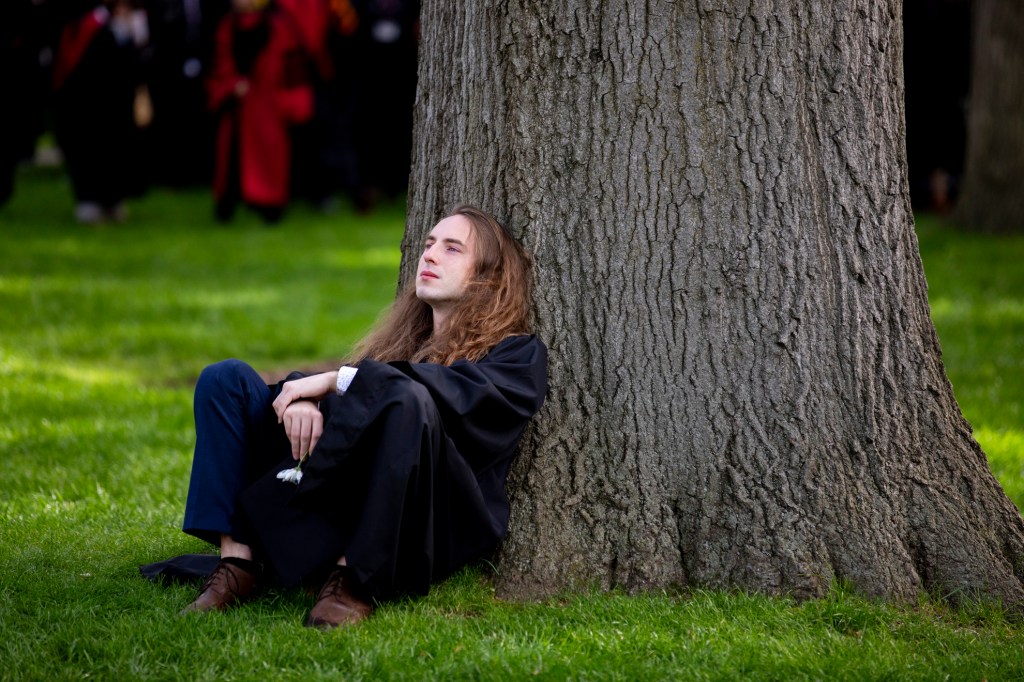
Aidan Fitzsimons of Winthrop House said he paused his studies for several years before returning to Harvard. “I’m gonna miss this place,” he said.
Veasey Conway/Harvard Staff Photographer
Giving disadvantaged Detroit youth a boost
“I didn’t see this for myself,” said Courtney Ebonique Smith, a newly minted graduate of the Harvard Extension School with a master’s degree in industrial-organizational psychology.
Smith grew up in foster care before being adopted and when she graduated from high school, she was living in a homeless shelter. Her experiences led her to start the Detroit Phoenix Center, a nonprofit in Detroit that provides housing, academic, and workforce support to young people who are experiencing housing insecurity and other barriers to opportunities.
“We provide them with support so they can thrive,” she said, “and maybe even come to Harvard.”
A few years after starting the nonprofit at the age of 25, Smith looked for ways to gain skills that she could immediately use as its CEO. She found the Extension School, which allowed her to take courses both on campus and from home.
In 2020, she started the Extension School’s Nonprofit Management Graduate Certificate. When she finished, she enrolled in a master’s degree. The flexibility of the program allowed her to work whenever she had time to spare. “I was able to do it at night, on the plane, in the morning, during the day,” she said, laughing. “It’s very convenient.”
Smith said that her skills in fundraising and project management improved after taking classes in both subjects. Overall, she said, the program taught her “how to be adaptable and to juggle a lot of things at once.”
Looking back, Smith is proud of the journey that led to her graduating from Harvard. “I want every person to know that it doesn’t matter where you come from,” she said. “There are opportunities for you to be able to live out the dreams that you have for your life and to thrive.”
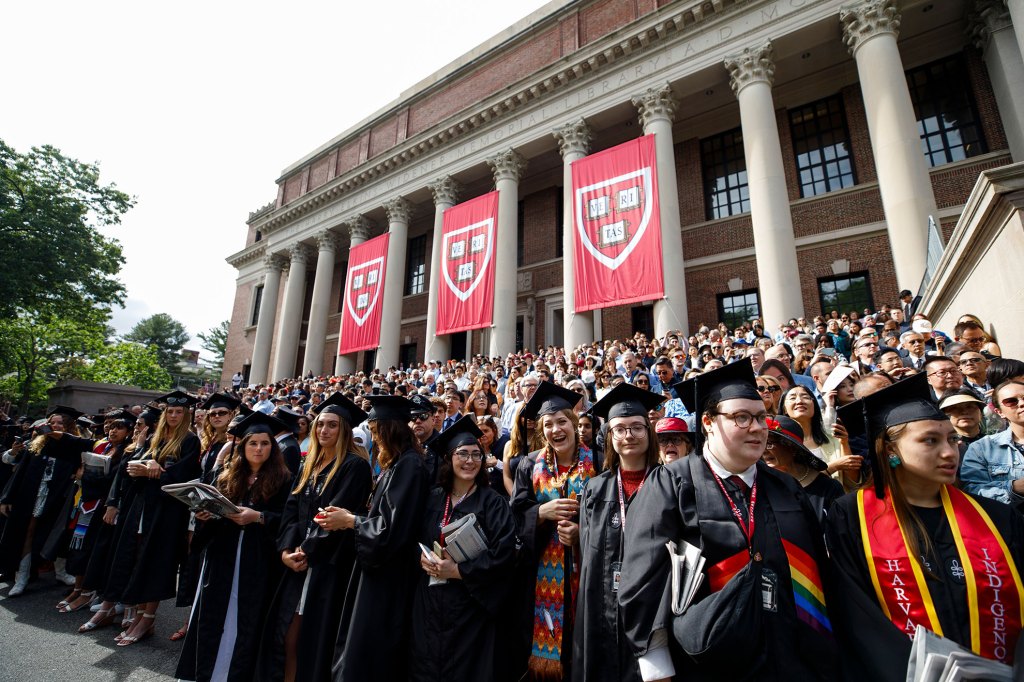
Graduates pose in front of Widener Library.
Photo by Grace DuVal
A real team guy
Scott Woods II is a person of loyalties.
First on the list of the economics graduate is his House, Cabot.
“I’m a big quad guy — very loyal to the quad,” he said, while toting the Cabot House sign used in the Commencement Exercises across the Yard. “I boast about how great it is, even though it catches a lot of flak.”
Woods said Cabot, which is on the “quad,” is seen by some as less desirable than the other Houses, which are closer to the main campus along the Charles River. And he gets it because he started out that way.
“I remember it vividly,” he said of the moment he got his housing assignment as a first-year. “You could hear a pin drop — no one was excited about it at first. But then as soon as we got out there, we just realized it was all a myth, and we had to make it what it was, which was a good time.”
Besides being a Cabot House booster, Woods is also a Crimson football loyalist, having been a wide receiver on the team.
“Harvard came in with a last-minute offer that changed my life. And since I committed to play here, my life has been on the upward trend,” he said.
Woods said he’s off to the University of Maine next year, where he’ll pursue an M.B.A. Originally from Virginia, he said in all seriousness that Cabot helped make Harvard home.
“The people in Cabot made me feel seen and made me feel comfortable. It made me feel like I had a family,” he said, grinning. “Being all the way out here you don’t really have too many people to interact with.”
Woods was joined on Commencement Day by his mom, dad, brother, and two grandmothers. He said they were proud of their Cabot House mascot.
“They thought I was the man. They wanted to get a picture with me,” he said.
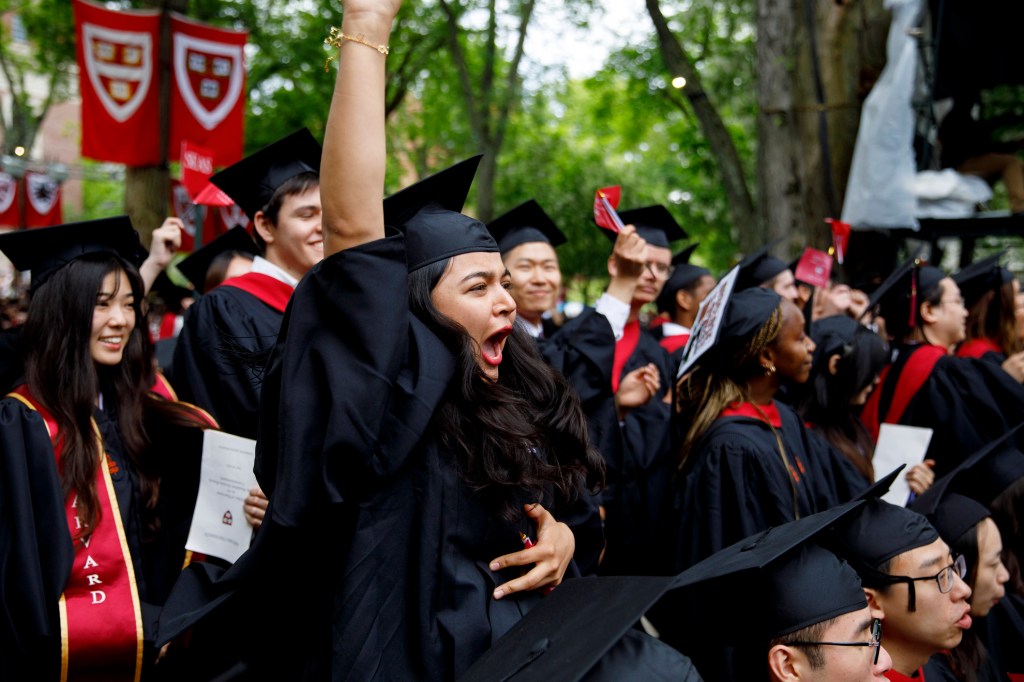
Maryam Hussaini (center) cheers as her group of graduate students is recognized during the Commencement Exercises.
Veasey Conway/Harvard Staff Photographer
‘It’s surreal’
Jean Filo hustled to meet his parents after the Commencement ceremony, part of a departing wave of other Medical School graduates identifiable by the stethoscopes they wore along with their caps and gowns.
He paused for a moment to reflect on what his graduation meant not only to himself as an immigrant from Syria but also to his parents waiting eagerly to hug their son.
“It’s surreal,” he said. “Today is mostly about my parents and them enjoying this.”
During his time at Harvard Medical School, Filo worked in cerebrovascular research at the Beth Israel Deaconess Medical Center’s Brain Aneurysm Institute. He said he’s now heading off to Philadelphia to do a residency in neurosurgery.
But first, he said, rushing off, he had dinner plans with the parents.
Family pride — and impact
Caroline Maynes and Sierra Dorweiler have been watching their son and brother, respectively, for years, and, though they know him well, they’re still impressed. Nicholas Maynes, who graduated with a master’s degree in public administration on Thursday, has been on a yearslong journey that has taken him to war and back.
As the pair watched the Commencement unfold in Tercentenary Theatre, they said that Maynes has been entirely self-driven, starting with his education at West Point.
His Army service as a field artillery officer included deployment to Iraq during the liberation of Mosul. After that, he earned a master’s degree in business administration at the University of California at Berkeley before enrolling at Harvard to study at the Kennedy School.
“Academics has just been his passion,” said Caroline.
Watching her brother couldn’t help but have an impact on her, Dorweiler said. Maynes has always encouraged her to focus on what can be done, not what can’t, she added.
“I’m so proud because he’s been the one who’s pushed me to achieve academically,” she said. “He just makes it seem like pretty much anything is possible.”
Her goal: To help as many people learn as she can
Growing up in India, Devina Neema — who graduated Thursday from the Harvard Graduate School of Education — observed a major disparity between private and public schools. Her school had good classrooms and teachers and 40 hours of class every week. In public schools, students could get four or five hours of instruction, with few books and limited interaction between teachers and parents.
After graduating from college, Neema began teaching in public schools through a nonprofit program. The conditions weren’t ideal. At times, she led classrooms filled with 90 students. “It was a new world for me,” she said. “I realized this is where education needs to happen and get better.”
For different nonprofits, Neema worked across rural and urban areas to understand how students learned at different types of schools. How did they learn their first language? What were the math disparities? Were there any technological solutions?
To explore those questions more thoroughly, and to get a more formal education in teaching and how to change education at a systemic level, Neema looked to the HGSE’s master’s program in Learning Design, Innovation, and Technology.
At Harvard, Neema explored how people of different ages learn and how technology can augment it. She also studied how learners can develop transferable skills, such as social skills, and apply them to science, technology, engineering, and mathematics.
Having never formally studied education in a university setting, she was struck — and inspired — by the sheer amount of research her professors performed in their areas of expertise. “If you have to truly understand something at heart,” she said, “then you have to broaden your perspective but also narrow down your niche and go deep.”
With her program now complete, Neema plans to stay in the area so she can continue to learn and “build something here,” she said. After studying the education systems in many countries and the workings of international and humanitarian aid, she wants to help as many people learn as she can — with any tools she has.
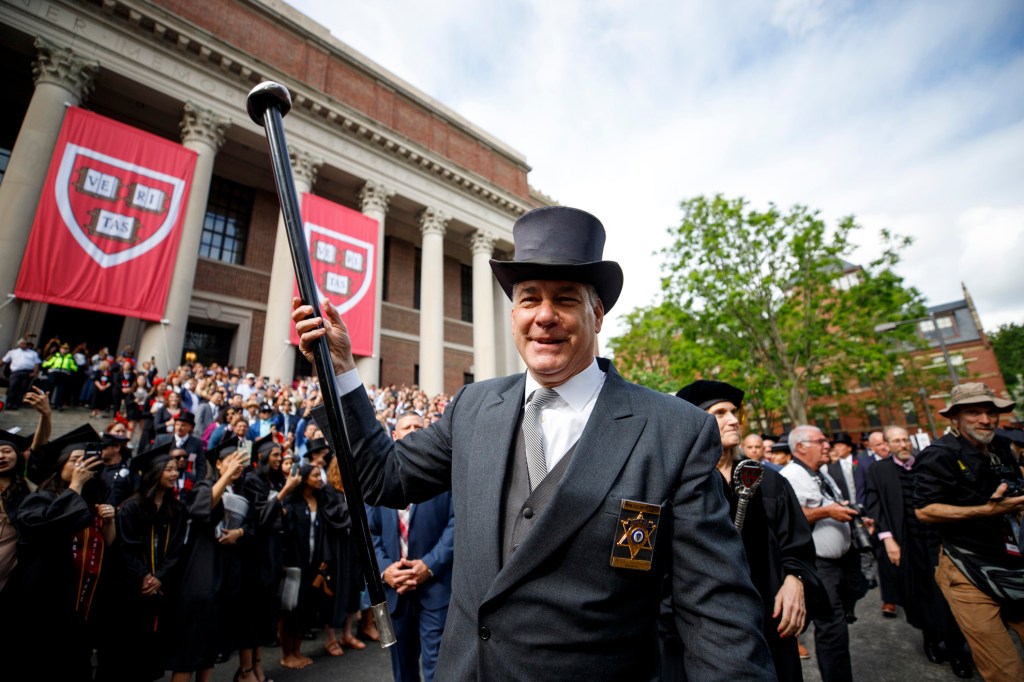
Sheriff of Middlesex County Peter J. Koutoujian leads the processional into Harvard Yard.
Photo by Grace DuVal
What’s to come
Like many, College seniors Kylie Hunts-in-Winter and Taylor Larson weren’t quite sure what to expect from Morning Exercises on what is typically a joyful day.
Given the tensions sparked by Harvard’s legal battles with the Trump administration, they weren’t certain how graduating students would respond to University officials or the celebration.
“Some people were saying on [the social media app] Sidechat that they want to cheer for [President Alan] Garber, and other people. And so, I’m interested to see how this plays out,” said Hunts-in-Winter, a champion martial artist who studied sociology and Ethnicity, Migration, Rights.
The duo stood with Larson’s Adams House colleagues as undergraduates prepared to process into Tercentenary Theatre. Not long after, Garber and other University officials received robust cheers from the assembled crowd as they made their way toward the stage.
For Larson, a history and literature concentrator from Minnesota, the morning was one of conflicting emotions. While it was “exciting,” she confessed to also feeling “overwhelmed by everything that’s to come after this.”
Both identify as first-generation, low-income students. Larson plans to pursue a master’s degree in history in London, while Hunts-in-Winter, whose family is Lakota from the Standing Rock Reservation, intends to remain in the Boston area to pursue public service work with Native American communities.
“I am glad and I’m very grateful for my time,” said Larson. “I met all my best friends here and had a lot of opportunities because of Harvard funding.”
Dunster House ceremony: Lasting friendships
Residents of Dunster House returned to their home of the last three years to gather with parents, grandparents, siblings, and friends, receive degrees, enjoy lunch — and let it all sink in.
Graduate Minsoo Kwon, a Mather House resident, was at Dunster to celebrate her friend Hannah Ahn, whom she met five years ago during a gap year in Korea.
Kwon said the two, who have remained friends throughout college, will both be heading off to law school in the fall — with plans already in the works for frequent visits.
“I’ll be at Yale, and Hannah will be at Columbia,” she said. “Still along the Amtrak line.”
Ahn earned a degree in government while Kwon got hers in neuroscience. She’s interested in drug and healthcare policies that overlap law and science.
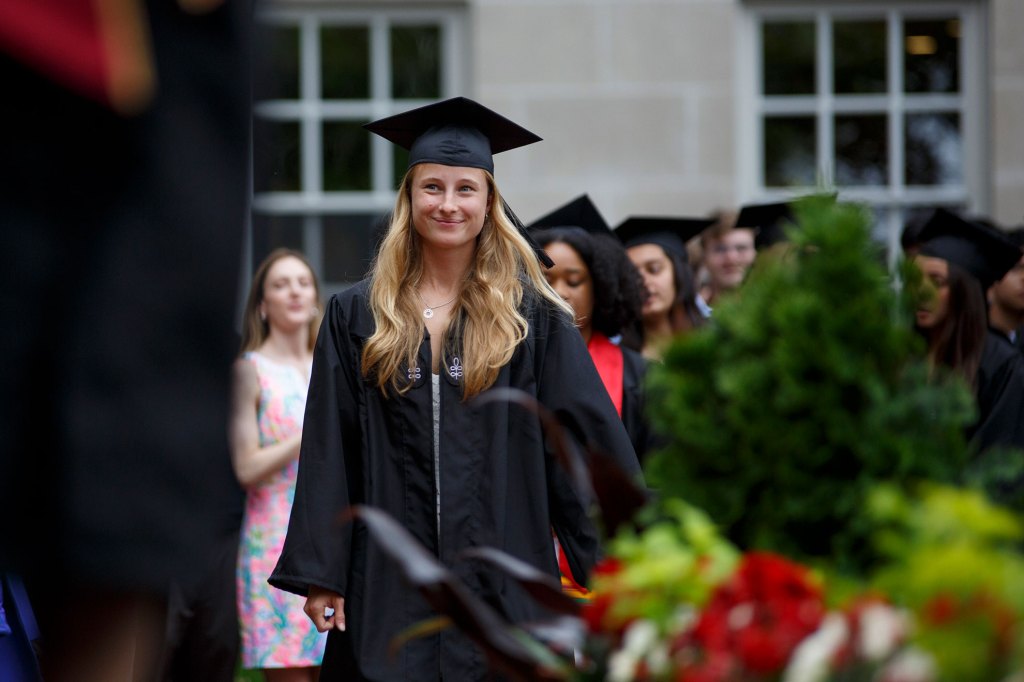
Sara Silarszka receives her diploma at Dunster House.
Photo by Grace DuVal
Two other friends sharing in the afternoon festivities were Sara Silarszka and Quincy Brunner Donley — first-year roommates who got along so well they stayed together for the next three years at Dunster.
“We were in a double for three years together, and so this is the first year we had our own rooms,” Donley said.
Asked whether they missed sharing the close quarters, Donley said, “I think I did,” followed by a quick “definitely” by Silarszka.
Both roommates made their mark in Harvard athletics — Silarszka, as a field hockey player, now with a degree in integrated biology, and Donley, a Nordic skier with a degree in economics.
Donley said after graduation, she’s moving back to her home state of Alaska to pursue professional skiing.
“At least for the foreseeable future,” she said.
Silarszka, who grew up in Virginia, said she is hoping to visit her old roomie. And she’s taking a gap year before applying to medical school.
“I just love living with my best friends,” she said. “You’ll just never be this close to so many people you love, so that’ll be hard to leave behind.”
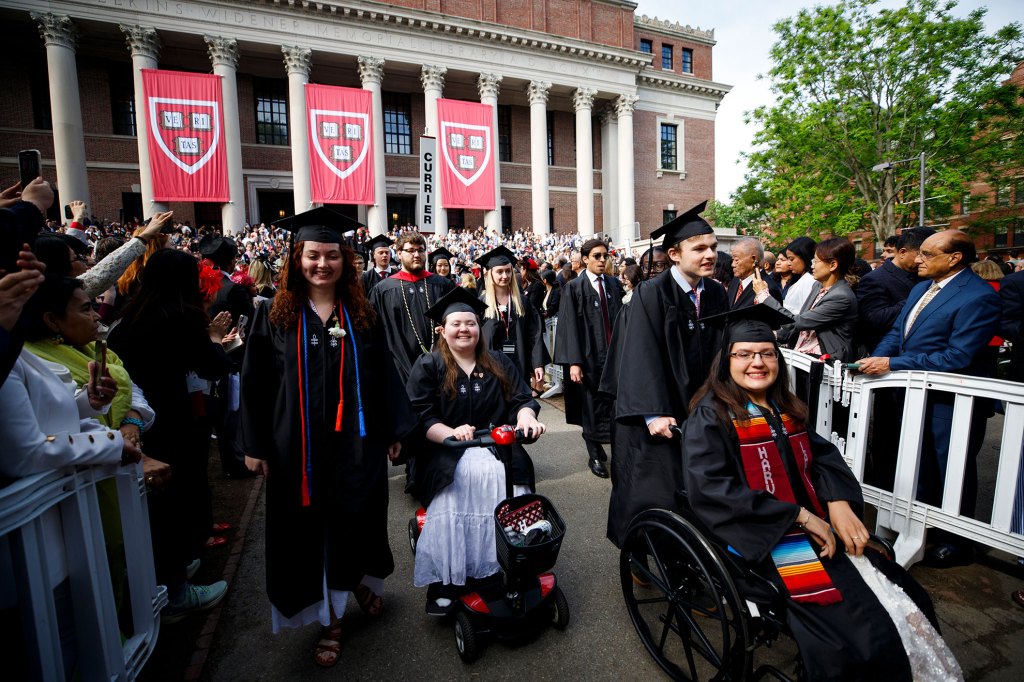
Graduates entering Tercentenary Theatre.
Photo by Grace DuVal
Back to the beginning
Chidimma Adinna, a graduating senior from Adams House, left Nigeria at age 6 when her parents immigrated to California. Now she’s set to return, thanks to a fellowship to teach at a high school some of her family members still attend.
While her desire to return to Nigeria stems from her family history, the how and why owe largely to her studies at Harvard. A psychology concentrator, Adinna became interested in climate change during her time as an undergrad. As a fellow in Nigeria, she plans to promote sustainability and help the school take steps to fight the climate crisis. She’ll also act as a tutor and mentor students who want to go to college.
“Since I was younger, I was always trying to be connected to my community in Nigeria,” she said. “This has involved me donating clothes through organizations that I founded with my family, and it’s a mission that I’m trying to continue, even postgrad. It’s been evolving over the years I’ve been trying to give back to my community.”
Connecting flights?
Justin Biassou spent a lot of time in an airplane cabin on the way to his master’s degree.
Starting in 2022, he would occasionally commute from Seattle to Cambridge for in-person classes from Harvard Extension School, where he earned an A.L.M. in international relations.
But Biassou is comfortable in the air. He started flight training at 12 and got his private pilot’s license at 17. Even as he studied, he was working full time leading an air safety team for the Federal Aviation Administration.
Biassou took up his coursework in January 2022, when the COVID-19 pandemic still loomed over campuses, classrooms, and airports.
“I took one class per semester, and each one had this incredible group of students with all these different backgrounds — often they were working, too.”
Many of Biassou’s courses did take place online. But person-to-person time in Cambridge was well worth the flight, as were a few intensive January courses crammed into his time off from work.
At a time when “a lot of us just felt isolated, and very uneasy,” Biassou recalled, class “just really brought a lot of us together … These have become lifelong friends.”
The Extension School allowed Biassou a chance to expand his skill set in aviation safety. With new expertise in international relations, he hopes to “harmonize” safety efforts beyond U.S. borders, with authorities like the United Nations and the International Civil Aviation Organization.
His three-year, transcontinental balancing act may have earned Biassou “a lot of gray hairs.”
“But I had a really incredible support system: my significant other Michelle, my parents, my sisters,” Biassou said, as his family stood by. “They allowed me to focus on the things that needed to get done: Yes, 40 hours a week keeping aviation safe, then also working on my classes.”
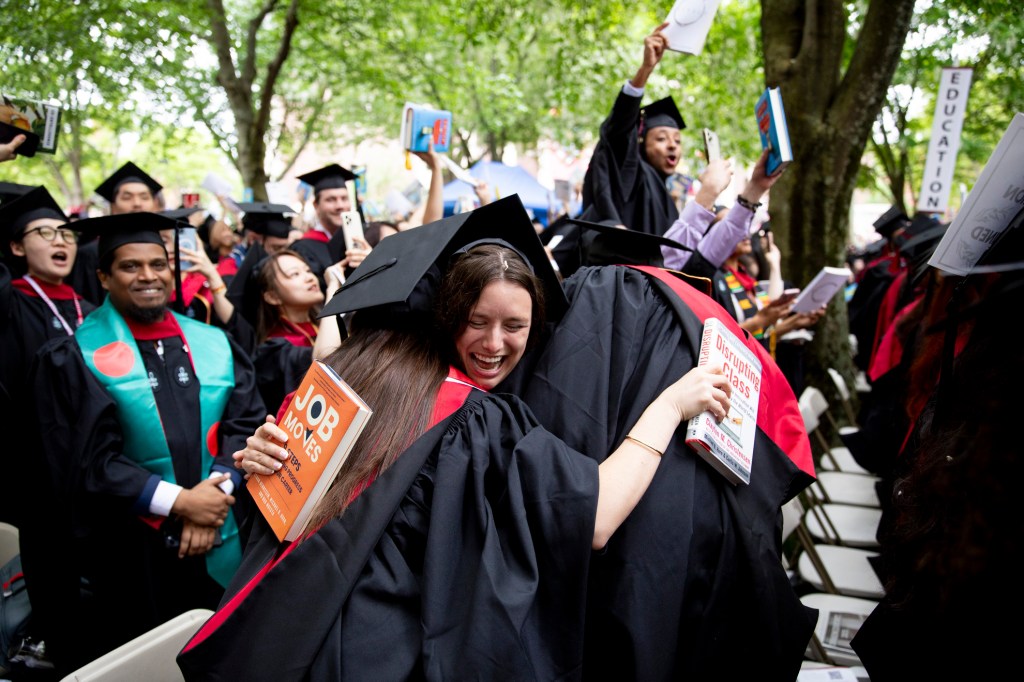
Makena Tenpenny (center) embraces her fellow Harvard Graduate School of Education classmates as their class is recognized.
Veasey Conway/Harvard Staff Photographer
A child of immigrants gives back
Many faculty and graduates at Commencement ceremonies wore stickers, flowers, and other symbols in support of Harvard’s international students — now facing threats from the Trump administration.
For Daniel Roque-Coplín, J.D. ’25, the cause of safeguarding the rights of newcomers in America is personal — and the focus of his professional goals.
“Both of my parents are immigrants: My mom is from the Dominican Republic; my dad is from Cuba,” Roque-Coplín said, as he and his mother huddled before lunch. “They never in their lives dreamed that their son could go to a school like this one.”
His law school journey was not always easy — particularly at the beginning.
“First year, second year, you spend a lot of time in the library,” he said. “A lot of times, the studying can consume you, because you’re competing with everyone else, in a sense.”
Roque-Coplín said he was driven by a desire to help families like his own, with immigrant pasts and big ambitions in the United States.
Even before the latest tightening of immigration law and enforcement, the law did not always serve those families well, Roque-Coplín said.
He hopes to change that.
“Immigration law is intersectional, right? There are public-health needs, criminal needs, straightforward needs” related to legal status and asylum.
He had already begun that work in Cambridge as a student attorney in family practice with the Harvard Legal Aid Bureau, which offers free representation to low-income clients in Greater Boston.
Roque-Coplín acknowledged that he enters the legal professional at an acutely difficult moment for the families he hopes to serve. But he and other Law School graduates said they see that field as a chance to do urgent work.
“Through the grace of God, I’ve overcome — I’m here,” Roque-Coplín said. About the fights to come, “I’m nervous, I’m excited, and I feel, honestly, like nothing can stop me.”
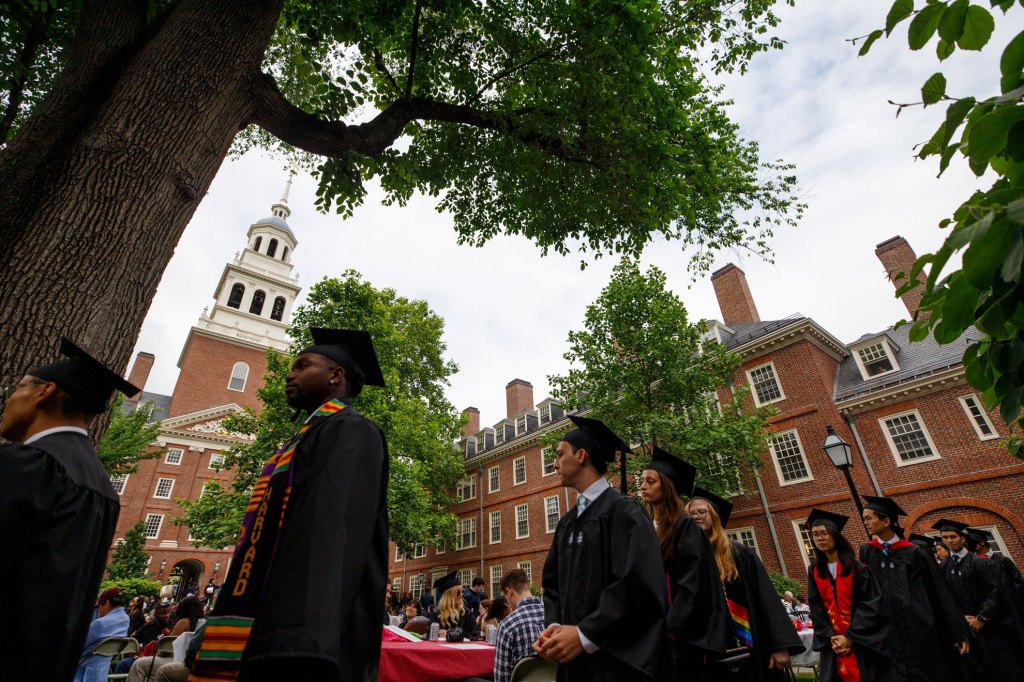
Graduates wait to receive their diplomas at Lowell House.
Photo by Grace DuVal
A star’s turn
As the official ceremonies of Commencement Day wound down, families gathered on the steps of Widener Library for photographs with their graduates.
Elio Kennedy-Yoon showed particular patience with the many iterations of family pictures on offer: his three siblings, separately and together; his father, then grandfather; his girlfriend; then the whole clan together.
You might credit Kennedy-Yoon’s recent experience with celebrity, as an actor and singer in Din & Tonics, the College a capella group. Just last year, he made a splash online with a viral solo version of Barry Manilow’s “Copacabana.” Fan art, mashups, and the group’s world tour ensued.
After Commencement, Kennedy-Yoon wore two sashes: one honoring his Asian American heritage and another for LGBT pride.
Even before that viral moment, the last five years have been transformative for Kennedy-Yoon.
First, a gender transition during the pandemic, and a jarring move from Utah to Cambridge.
“I love Utah, but the people can be very conservative. I really found a community here that’s very accepting, very diverse.” (Among that community was Kennedy-Yoon’s girlfriend, a few years older — and “the love of my life,” he said with a smile.)
Still, as a queer Asian American with some online visibility, it hasn’t been possible to dodge hostility or derision. When Donald Trump was elected president the first time, Kennedy-Yoon was 13. In this tumultuous spring, he said it feels like a long time to have lived in conflict with the country’s political leadership.
That has made the University’s resistance to Trump administration mean all the more.
“In a weird way. I’ve never been prouder to be a Harvard student than right now,” Kennedy-Yoon said. “That we’re standing up for academia, for knowledge, for truth … and against tyranny.”
Ready to start
When Annabeth Tao was an undergraduate at UCLA, she worked as a research assistant for a professor focused on computer game animation. In her year at Harvard’s Graduate School of Education, she added to that experience a better understanding of how students learn, which she plans to blend into a startup focused on devising interactive games to help students become more creative in STEM studies.
When she arrived on campus in the fall, enrolled in the Ed School’s Learning Design, Innovation, and Technology master’s degree program, Tao had a vague plan to use the arts to enhance education. Over the course of her studies, she refined that ambition, in part through conversations with fellow students. In fact, some of her best memories of her time at Harvard are the brainstorming sessions with classmates.
She’ll have to find a job while getting the startup off the ground, but said that she’s excited about the chance to help unleash creativity among students and teachers, shaping “a dynamic learning experience for kids.”




